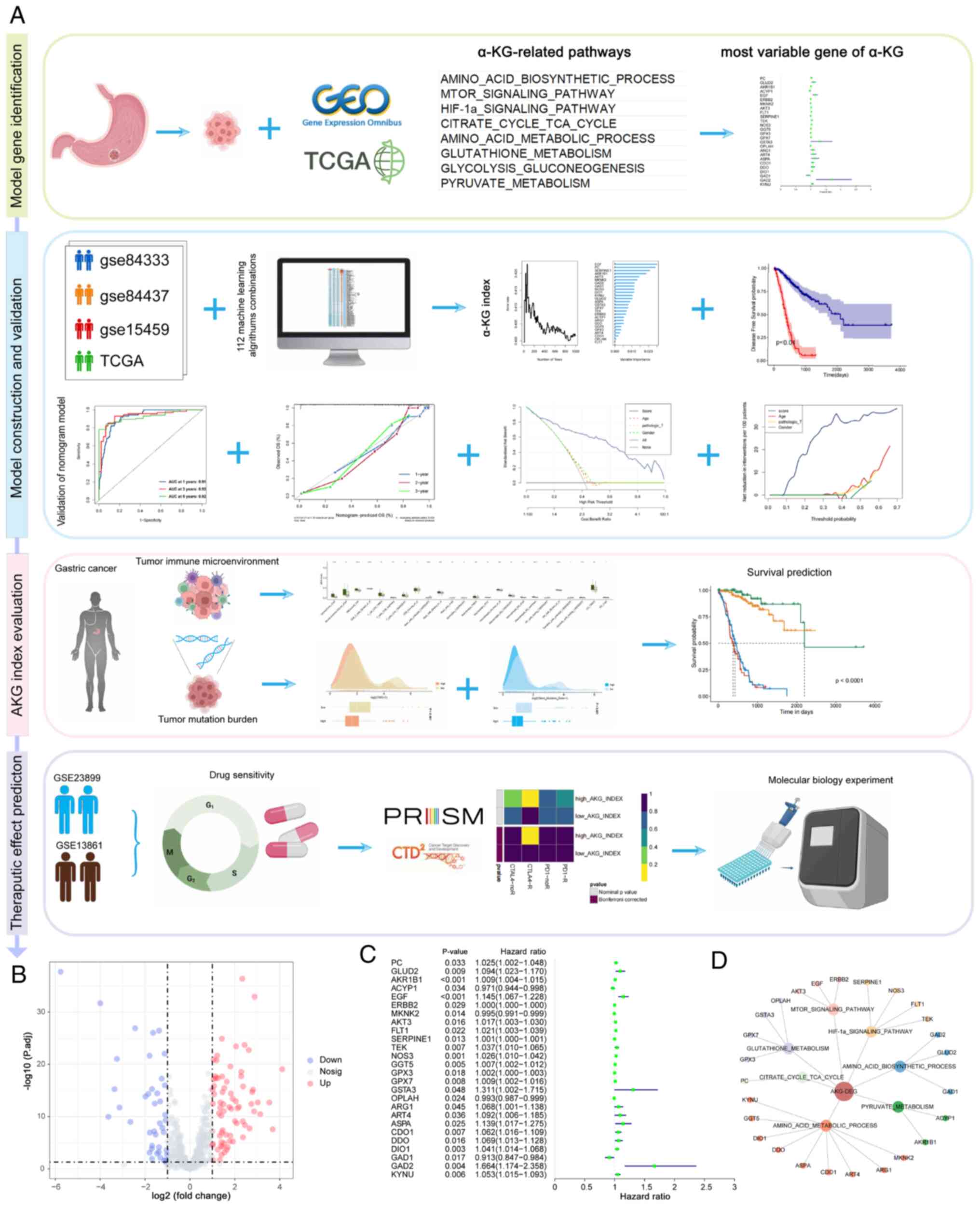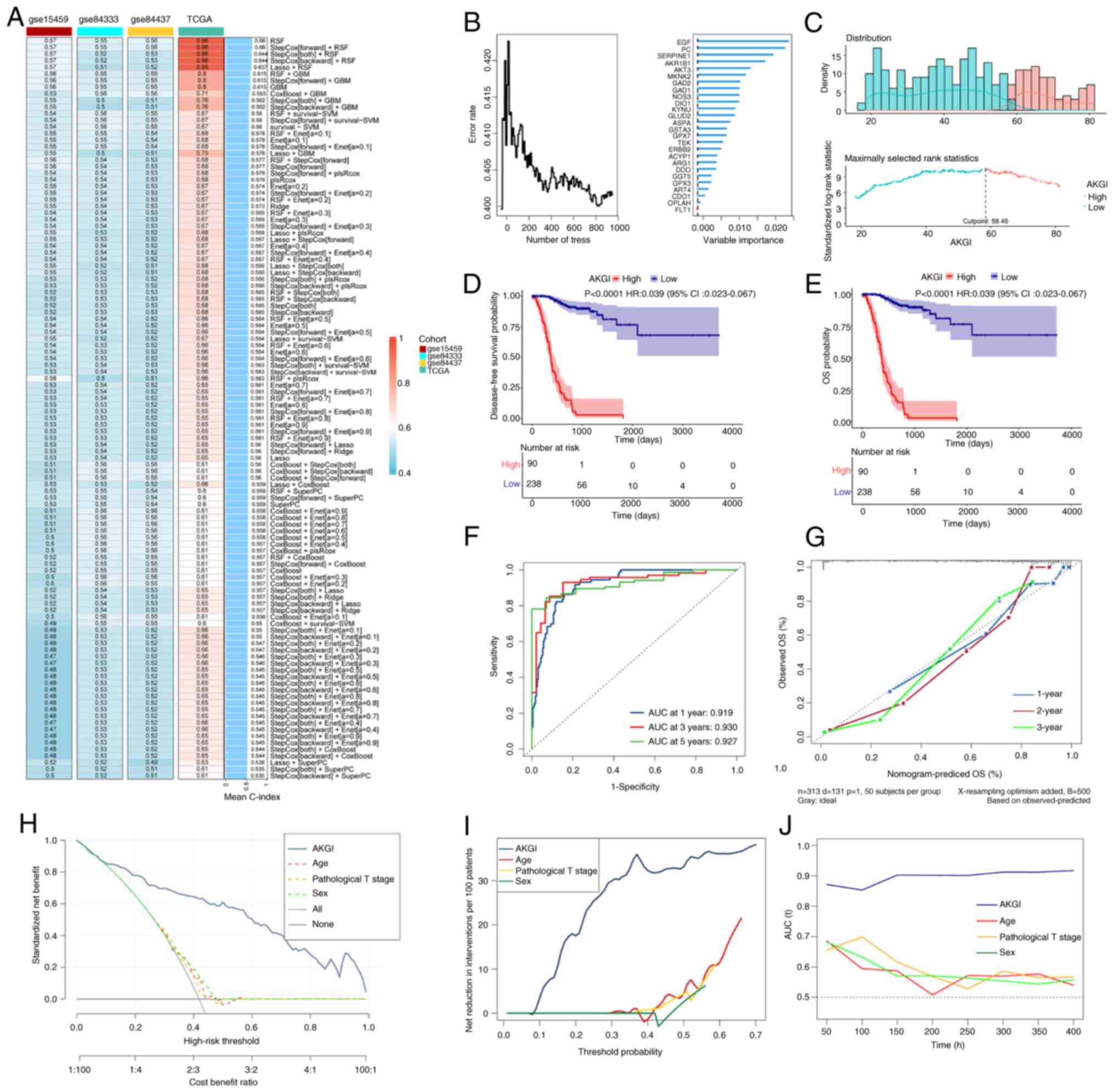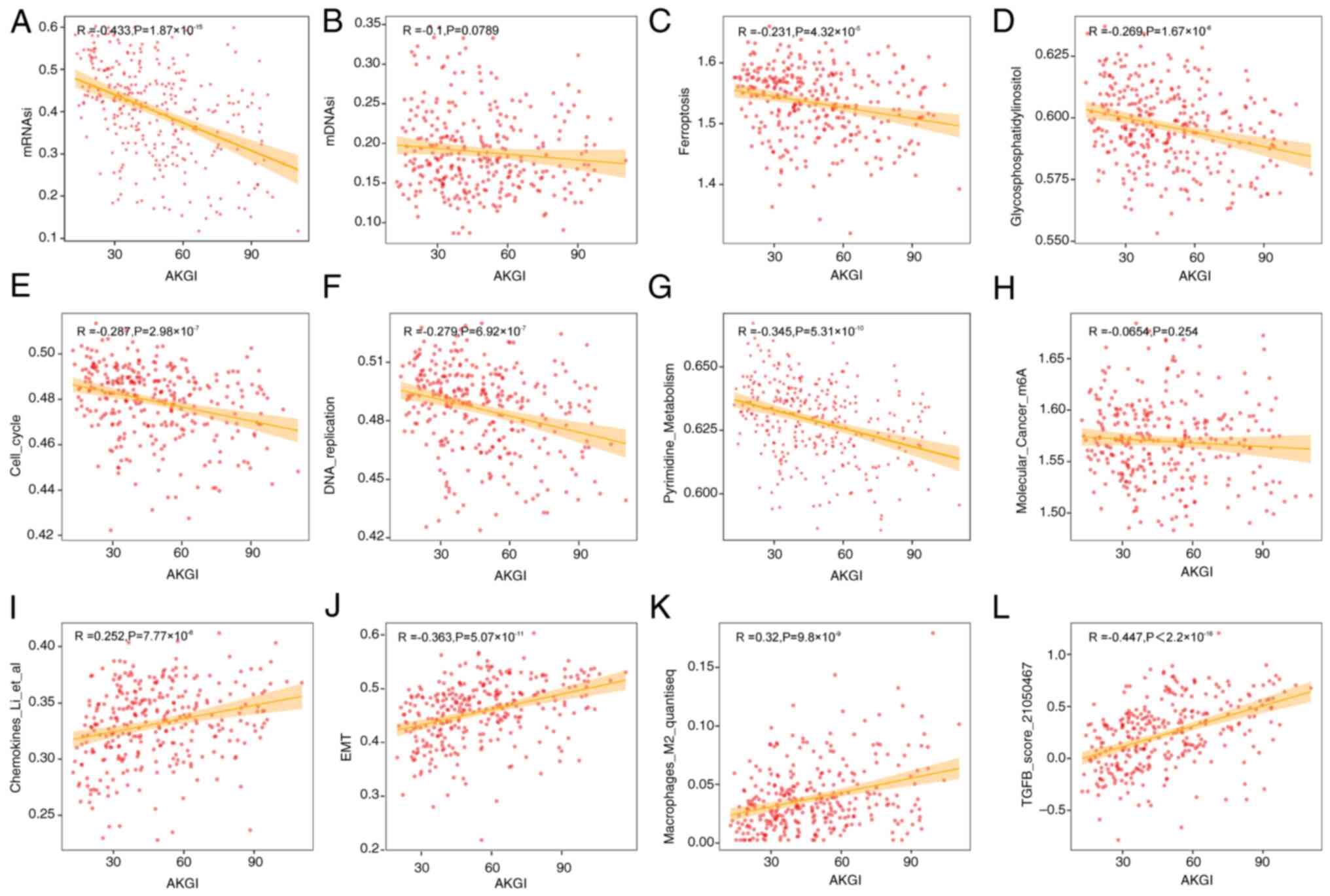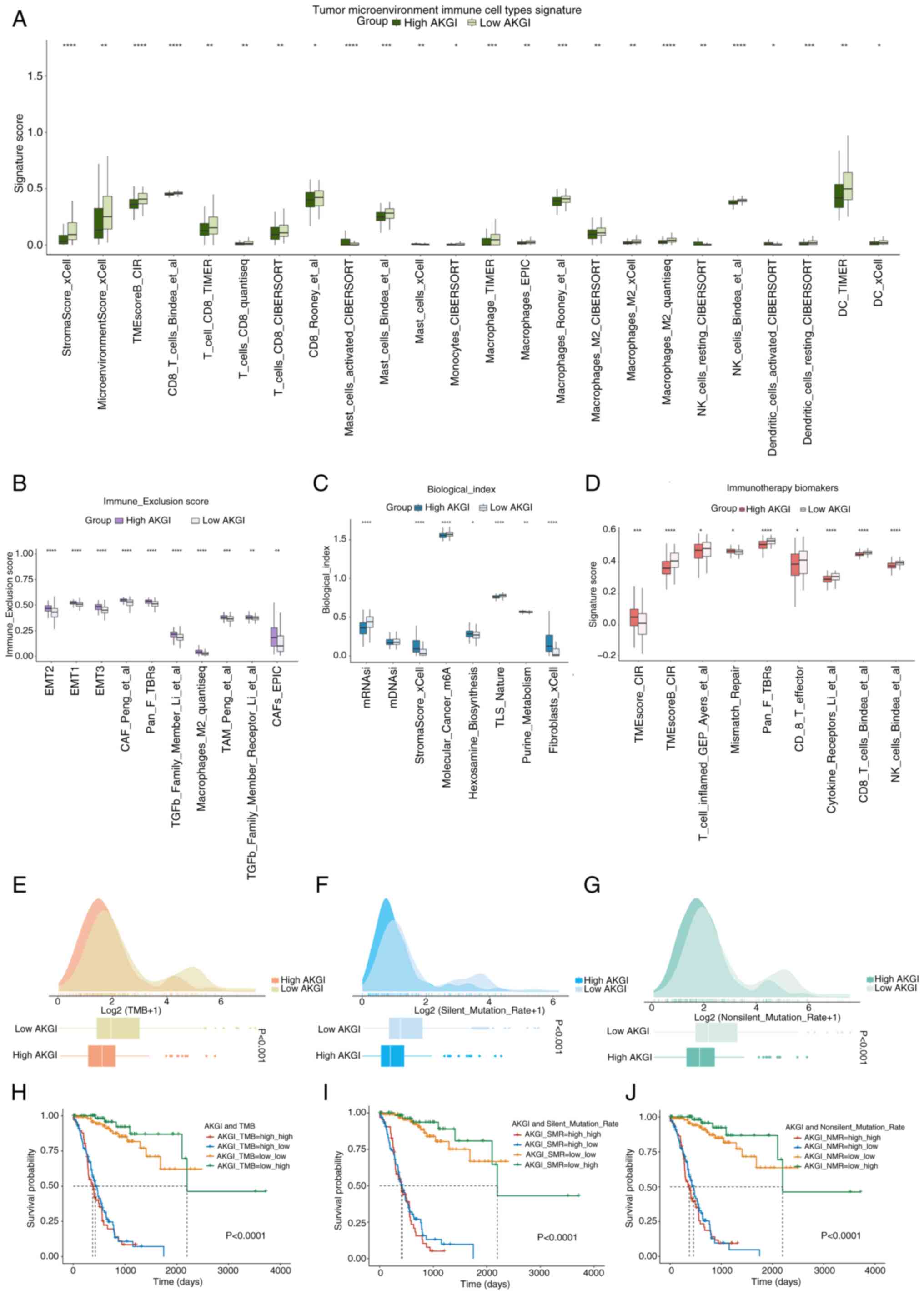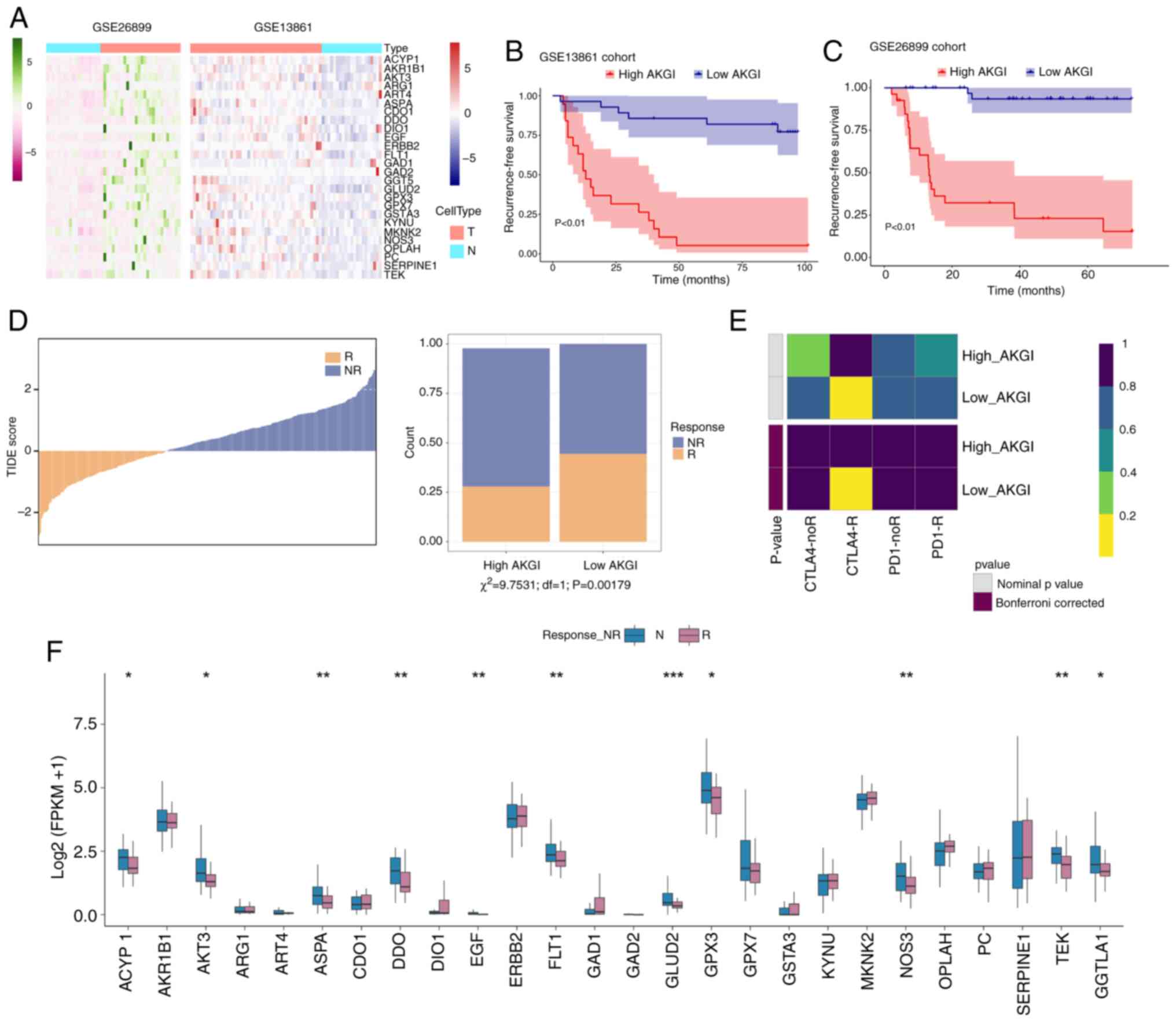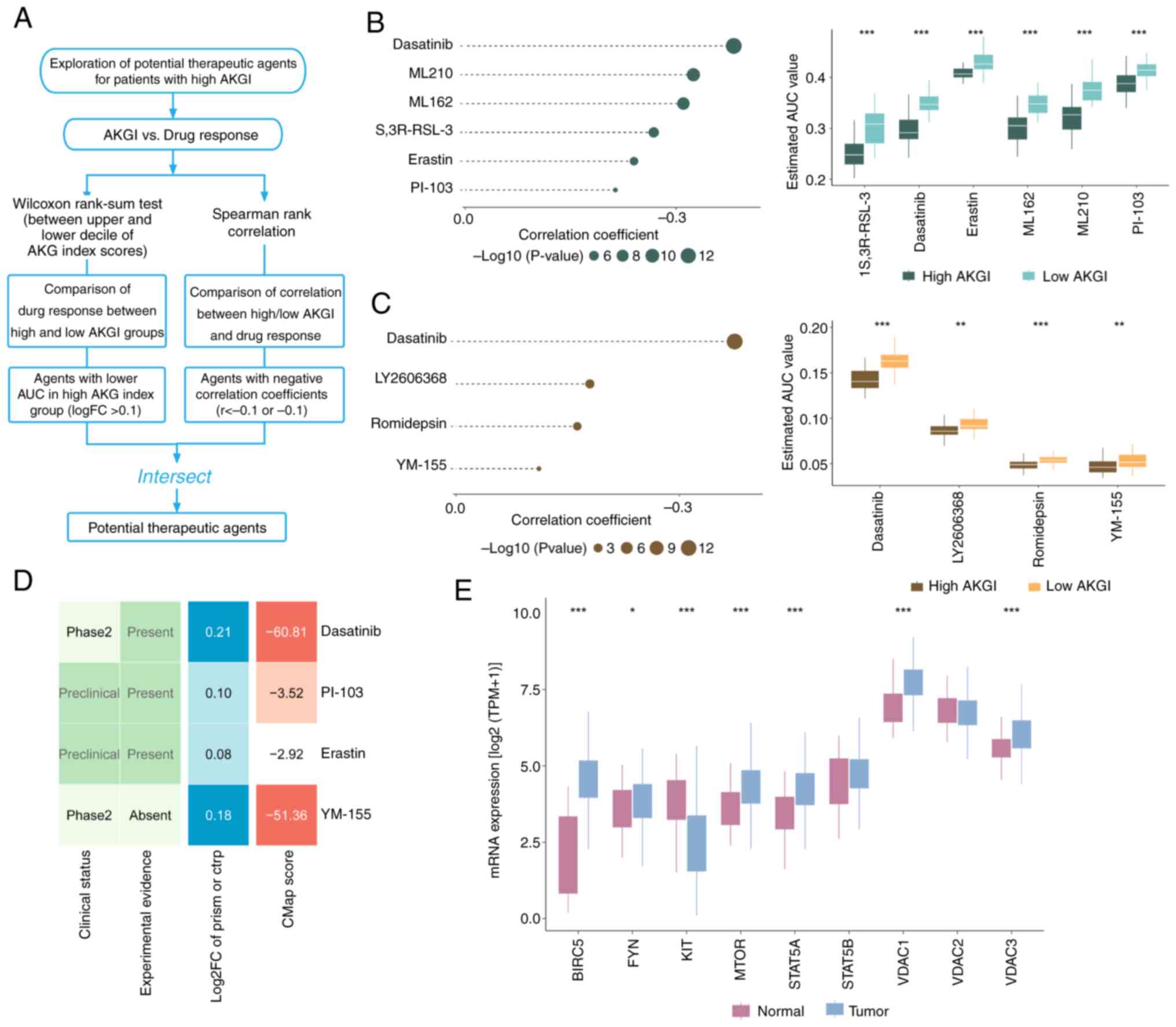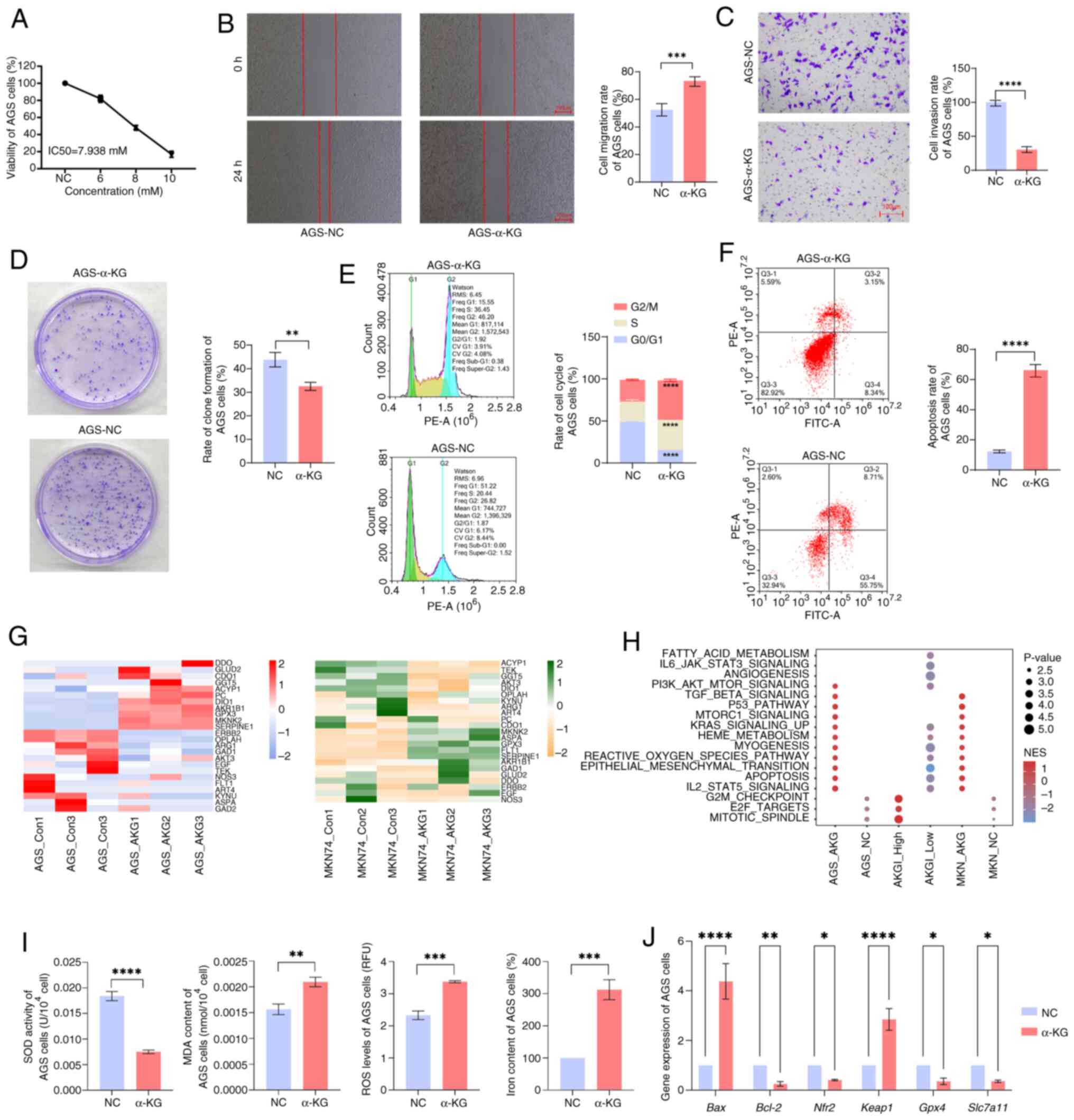|
1
|
Bray F, Laversanne M, Sung H, Ferlay J,
Siegel RL, Soerjomataram I and Jemal A: Global cancer statistics
2022: GLOBOCAN estimates of incidence and mortality worldwide for
36 cancers in 185 countries. CA Cancer J Clin. 74:229–263. 2024.
View Article : Google Scholar : PubMed/NCBI
|
|
2
|
He Y, Zhang H, Zhang Y, Wang P, Zhu K and
Ba Y: Comprehensive characterization of transforming growth factor
beta receptor 1 in stomach adenocarcinoma identifies a prognostic
signature for predicting clinical outcomes and immune infiltrates.
Int J Gen Med. 15:3375–3391. 2022. View Article : Google Scholar : PubMed/NCBI
|
|
3
|
Mao Y, Xia Z, Xia W and Jiang P: Metabolic
reprogramming, sensing, and cancer therapy. Cell Rep.
43:1150642024. View Article : Google Scholar : PubMed/NCBI
|
|
4
|
Xiao D, Zeng L, Yao K, Kong X, Wu G and
Yin Y: The glutamine-alpha-ketoglutarate (AKG) metabolism and its
nutritional implications. Amino Acids. 48:2067–2080. 2016.
View Article : Google Scholar : PubMed/NCBI
|
|
5
|
Naeini SH, Mavaddatiyan L, Kalkhoran ZR,
Taherkhani S and Talkhabi M: Alpha-ketoglutarate as a potent
regulator for lifespan and healthspan: Evidences and perspectives.
Exp Gerontol. 175:1121542023. View Article : Google Scholar : PubMed/NCBI
|
|
6
|
Tran KA, Dillingham CM and Sridharan R:
The role of α-ketoglutarate-dependent proteins in pluripotency
acquisition and maintenance. J Biol Chem. 294:5408–5419. 2019.
View Article : Google Scholar : PubMed/NCBI
|
|
7
|
Huang F, Luo X, Ou Y, Gao Z, Tang Q, Chu
Z, Zhu X and He Y: Control of histone demethylation by
nuclear-localized α-ketoglutarate dehydrogenase. Science.
381:eadf88222023. View Article : Google Scholar : PubMed/NCBI
|
|
8
|
Tran TQ, Hanse EA, Habowski AN, Li H,
Ishak Gabra MB, Yang Y, Lowman XH, Ooi AM, Liao SY, Edwards RA, et
al: α-ketoglutarate attenuates Wnt signaling and drives
differentiation in colorectal cancer. Nat Cancer. 1:345–358. 2020.
View Article : Google Scholar : PubMed/NCBI
|
|
9
|
Atlante S, Visintin A, Marini E, Savoia M,
Dianzani C, Giorgis M, Sürün D, Maione F, Schnütgen F, Farsetti A,
et al: α-ketoglutarate dehydrogenase inhibition counteracts breast
cancer-associated lung metastasis. Cell Death Dis. 9:7562018.
View Article : Google Scholar : PubMed/NCBI
|
|
10
|
Zhang B, Peng H, Zhou M, Bao L, Wang C,
Cai F, Zhang H, Wang JE, Niu Y, Chen Y, et al: Targeting BCAT1
Combined with α-ketoglutarate triggers metabolic synthetic
lethality in glioblastoma. Cancer Res. 82:2388–2402. 2022.
View Article : Google Scholar : PubMed/NCBI
|
|
11
|
Greilberger J, Erlbacher K, Stiegler P,
Wintersteiger R and Herwig R: Different RONS generation in MTC-SK
and NSCL cells lead to varying antitumoral effects of
α-ketoglutarate + 5-HMF. Curr Issues Mol Biol. 45:6503–6525. 2023.
View Article : Google Scholar : PubMed/NCBI
|
|
12
|
Wang B, Ye Y, Yang X, Liu B, Wang Z, Chen
S, Jiang K, Zhang W, Jiang H, Mustonen H, et al: SIRT2-dependent
IDH1 deacetylation inhibits colorectal cancer and liver metastases.
EMBO Rep. 21:e481832020. View Article : Google Scholar : PubMed/NCBI
|
|
13
|
Gunn K, Myllykoski M, Cao JZ, Ahmed M,
Huang B, Rouaisnel B, Diplas BH, Levitt MM, Looper R, Doench JG, et
al: (R)-2-hydroxyglutarate inhibits KDM5 histone lysine
demethylases to drive transformation in IDH-mutant cancers. Cancer
Discov. 13:1478–1497. 2023. View Article : Google Scholar : PubMed/NCBI
|
|
14
|
Chou FJ, Liu Y, Lang F and Yang C:
D-2-hydroxyglutarate in glioma biology. Cells. 10:23452021.
View Article : Google Scholar : PubMed/NCBI
|
|
15
|
Bhavya B, Anand CR, Madhusoodanan UK,
Rajalakshmi P, Krishnakumar K, Easwer HV, Deepti AN and Gopala S:
To be wild or mutant: Role of Isocitrate Dehydrogenase 1 (IDH1) and
2-Hydroxy Glutarate (2-HG) in gliomagenesis and treatment outcome
in glioma. Cell Mol Neurobiol. 40:53–63. 2020. View Article : Google Scholar : PubMed/NCBI
|
|
16
|
Wang Y, Guo YR, Liu K, Yin Z, Liu R, Xia
Y, Tan L, Yang P, Lee JH, Li XJ, et al: KAT2A coupled with the
KAT2A coupled with the α-KGDH complex acts as a histone H3
succinyltransferase. Nature. 552:273–277. 2017. View Article : Google Scholar : PubMed/NCBI
|
|
17
|
Colaprico A, Silva TC, Olsen C, Garofano
L, Cava C, Garolini D, Sabedot TS, Malta TM, Pagnotta SM,
Castiglioni I, et al: TCGAbiolinks: An R/Bioconductor package for
integrative analysis of TCGA data. Nucleic Acids Res. 44:e712016.
View Article : Google Scholar : PubMed/NCBI
|
|
18
|
Muratani M, Deng N, Ooi WF, Lin SJ, Xing
M, Xu C, Qamra A, Tay ST, Malik S, Wu J, et al: Nanoscale chromatin
profiling of gastric adenocarcinoma reveals cancer-associated
cryptic promoters and somatically acquired regulatory elements. Nat
Commun. 5:43612014. View Article : Google Scholar : PubMed/NCBI
|
|
19
|
Yoon SJ, Park J, Shin Y, Choi Y, Park SW,
Kang SG, Son HY and Huh YM: Deconvolution of diffuse gastric cancer
and the suppression of CD34 on the BALB/c nude mice model. BMC
Cancer. 20:3142020. View Article : Google Scholar : PubMed/NCBI
|
|
20
|
Oh SC, Sohn BH, Cheong JH, Kim SB, Lee JE,
Park KC, Lee SH, Park JL, Park YY, Lee HS, et al: Clinical and
genomic landscape of gastric cancer with a mesenchymal phenotype.
Nat Commun. 9:17772018. View Article : Google Scholar : PubMed/NCBI
|
|
21
|
Cho JY, Lim JY, Cheong JH, Park YY, Yoon
SL, Kim SM, Kim SB, Kim H, Hong SW, Park YN, et al: Gene expression
signature-based prognostic risk score in gastric cancer. Clin
Cancer Res. 17:1850–1857. 2011. View Article : Google Scholar : PubMed/NCBI
|
|
22
|
Ritchie ME, Phipson B, Wu D, Hu Y, Law CW,
Shi W and Smyth GK: limma powers differential expression analyses
for RNA-sequencing and microarray studies. Nucleic Acids Res.
43:e472015. View Article : Google Scholar : PubMed/NCBI
|
|
23
|
Yu G, Wang LG, Han Y and He QY:
clusterProfiler: An R package for comparing biological themes among
gene clusters. OMICS. 16:284–287. 2012. View Article : Google Scholar : PubMed/NCBI
|
|
24
|
Zeng D, Ye Z, Shen R, Yu G, Wu J, Xiong Y,
Zhou R, Qiu W, Huang N, Sun L, et al: IOBR: Multi-omics
immuno-oncology biological research to decode tumor
microenvironment and signatures. Front Immunol. 12:6879752021.
View Article : Google Scholar : PubMed/NCBI
|
|
25
|
Malta TM, Sokolov A, Gentles AJ,
Burzykowski T, Poisson L, Weinstein JN, Kamińska B, Huelsken J,
Omberg L, Gevaert O, et al: Machine learning identifies stemness
features associated with oncogenic dedifferentiation. Cell.
173:338–354.e15. 2018. View Article : Google Scholar : PubMed/NCBI
|
|
26
|
Zhang B, Wu Q, Li B, Wang D, Wang L and
Zhou YL: m6A regulator-mediated methylation modification
patterns and tumor microenvironment infiltration characterization
in gastric cancer. Mol Cancer. 19:532020. View Article : Google Scholar : PubMed/NCBI
|
|
27
|
Jiang P, Gu S, Pan D, Fu J, Sahu A, Hu X,
Li Z, Traugh N, Bu X, Li B, et al: Signatures of T cell dysfunction
and exclusion predict cancer immunotherapy response. Nat Med.
24:1550–1558. 2018. View Article : Google Scholar : PubMed/NCBI
|
|
28
|
Jin Q, Dai Y, Wang Y, Zhang S and Liu G:
High kinesin family member 11 expression predicts poor prognosis in
patients with clear cell renal cell carcinoma. J Clin Pathol.
72:354–362. 2019. View Article : Google Scholar : PubMed/NCBI
|
|
29
|
Wang X, Wei P, Yang L, Liu F, Tong X, Yang
X and Su L: MicroRNA-20a-5p regulates the epithelial-mesenchymal
transition of human hepatocellular carcinoma by targeting RUNX3.
Chin Med J (Engl). 135:2089–2097. 2022. View Article : Google Scholar : PubMed/NCBI
|
|
30
|
Liu G, Li S, Yuan H, Hao M, Wurihan, Yun
Z, Zhao J, Ma Y and Dai Y: Effect of sodium alginate on mouse ovary
vitrification. Theriogenology. 113:78–84. 2018. View Article : Google Scholar : PubMed/NCBI
|
|
31
|
Dobin A, Davis CA, Schlesinger F, Drenkow
J, Zaleski C, Jha S, Batut P, Chaisson M and Gingeras TR: STAR:
Ultrafast universal RNA-seq aligner. Bioinformatics. 29:15–21.
2013. View Article : Google Scholar : PubMed/NCBI
|
|
32
|
Liao Y, Smyth GK and Shi W: featureCounts:
An efficient general purpose program for assigning sequence reads
to genomic features. Bioinformatics. 30:923–930. 2014. View Article : Google Scholar : PubMed/NCBI
|
|
33
|
Subramanian A, Tamayo P, Mootha VK,
Mukherjee S, Ebert BL, Gillette MA, Paulovich A, Pomeroy SL, Golub
TR, Lander ES and Mesirov JP: Gene set enrichment analysis: A
knowledge-based approach for interpreting genome-wide expression
profiles. Proc Natl Acad Sci USA. 102:15545–15550. 2005. View Article : Google Scholar : PubMed/NCBI
|
|
34
|
Xiong J, Yan C, Zhang Q and Zhang J:
α-ketoglutarate-dependent enzymes in breast cancer and therapeutic
implications. Endocrinology. 164:bqad0802023. View Article : Google Scholar : PubMed/NCBI
|
|
35
|
Zhang JY, Zhou B, Sun RY, Ai YL, Cheng K,
Li FN, Wang BR, Liu FJ, Jiang ZH, Wang WJ, et al: The metabolite
α-KG induces GSDMC-dependent pyroptosis through death receptor
6-activated caspase-8. Cell Res. 31:980–997. 2021. View Article : Google Scholar : PubMed/NCBI
|
|
36
|
Wang C, Wang B, Wei Y, Li S, Ren J, Dai Y
and Liu G: Effect of Gentianella acuta (Michx.) Hulten against the
arsenic-induced development hindrance of mouse oocytes. BioMetals.
37:1411–1430. 2024. View Article : Google Scholar : PubMed/NCBI
|
|
37
|
Liu Z, Liu L, Weng S, Guo C, Dang Q, Xu H,
Wang L, Lu T, Zhang Y, Sun Z and Han X: Machine learning-based
integration develops an immune-derived lncRNA signature for
improving outcomes in colorectal cancer. Nat Commun. 13:8162022.
View Article : Google Scholar : PubMed/NCBI
|
|
38
|
Chen H, Zheng Z, Yang C, Tan T, Jiang Y
and Xue W: Machine learning based intratumor heterogeneity
signature for predicting prognosis and immunotherapy benefit in
stomach adenocarcinoma. Sci Rep. 14:233282024. View Article : Google Scholar : PubMed/NCBI
|
|
39
|
Carey BW, Finley LW, Cross JR, Allis CD
and Thompson CB: Intracellular α-ketoglutarate maintains the
pluripotency of embryonic stem cells. Nature. 518:413–416. 2015.
View Article : Google Scholar : PubMed/NCBI
|
|
40
|
Cai Y, Lv L, Lu T, Ding M, Yu Z, Chen X,
Zhou X and Wang X: α-KG inhibits tumor growth of diffuse large
B-cell lymphoma by inducing ROS and TP53-mediated ferroptosis. Cell
Death Discov. 9:1822023. View Article : Google Scholar : PubMed/NCBI
|
|
41
|
Mayakonda A, Lin DC, Assenov Y, Plass C
and Koeffler HP: Maftools: Efficient and comprehensive analysis of
somatic variants in cancer. Genome Res. 28:1747–1756. 2018.
View Article : Google Scholar : PubMed/NCBI
|
|
42
|
Suzuki J, Yamada T, Inoue K, Nabe S,
Kuwahara M, Takemori N, Takemori A, Matsuda S, Kanoh M, Imai Y, et
al: The tumor suppressor menin prevents effector CD8 T-cell
dysfunction by targeting mTORC1-dependent metabolic activation. Nat
Commun. 9:32962018. View Article : Google Scholar : PubMed/NCBI
|
|
43
|
Kern Coquillat N, Picq L, Hamond A, Megy
P, Benezech S, Drouillard A, Lager-Lachaud N, Cahoreau E, Moreau M
and Fallone L: Pivotal role of exogenous pyruvate in human natural
killer cell metabolism. Nat Metab. 7:336–347. 2025. View Article : Google Scholar : PubMed/NCBI
|
|
44
|
Yu W, Wang S, Rong Q, Ajayi OE, Hu K and
Wu Q: Profiling the tumor-infiltrating lymphocytes in gastric
cancer reveals its implication in the prognosis. Genes (Basel).
13:10172022. View Article : Google Scholar : PubMed/NCBI
|
|
45
|
Palmeri M, Mehnert J, Silk AW, Jabbour SK,
Ganesan S, Popli P, Riedlinger G, Stephenson R, de Meritens AB,
Leiser A, et al: Real-world application of tumor mutational
burden-high (TMB-high) and microsatellite instability (MSI)
confirms their utility as immunotherapy biomarkers. ESMO Open.
7:1003362022. View Article : Google Scholar : PubMed/NCBI
|
|
46
|
Fu J, Li K, Zhang W, Wan C, Zhang J, Jiang
P and Liu XS: Large-scale public data reuse to model immunotherapy
response and resistance. Genome Med. 12:212020. View Article : Google Scholar : PubMed/NCBI
|
|
47
|
Ye J, Qin SS, Hughson AL, Hannon G, Salama
NA, Vrooman TG, Lesch ML, Lesser S, Eckl SL, Jewell R, et al:
Blocking LIF and PD-L1 enhances the antitumor efficacy of SBRT in
murine PDAC models. J Immunother Cancer. 13:e0108202025. View Article : Google Scholar : PubMed/NCBI
|
|
48
|
Pytel D, Sliwinski T, Poplawski T,
Ferriola D and Majsterek I: Tyrosine kinase blockers: New hope for
successful cancer therapy. Anticancer Agents Med Chem. 9:66–76.
2009. View Article : Google Scholar : PubMed/NCBI
|
|
49
|
Shen H, Hu X, Yang X, Chen J, Fu Y, He H,
Shi Y, Zeng R, Chang W and Zheng S: Inhibition of BRD4 enhanced the
tumor suppression effect of dasatinib in gastric cancer. Med Oncol.
40:92022. View Article : Google Scholar : PubMed/NCBI
|
|
50
|
Bougen-Zhukov N, Decourtye-Espiard L,
Mitchell W, Redpath K, Perkinson J, Godwin T, Black MA and Guilford
P: E-cadherin-deficient cells are sensitive to the multikinase
inhibitor dasatinib. Cancers (Basel). 14:16092022. View Article : Google Scholar : PubMed/NCBI
|
|
51
|
Wang X, Xue Q, Wu L, Wang B and Liang H:
Dasatinib promotes TRAIL-mediated apoptosis by upregulating
CHOP-dependent death receptor 5 in gastric cancer. FEBS Open Bio.
8:732–742. 2018. View Article : Google Scholar : PubMed/NCBI
|
|
52
|
Li X, Yang F, He N, Zhang M, Lv Y, Yu Y,
Dong Q, Hou X, Hao Y, An Z, et al: YM155 inhibits neuroblastoma
growth through degradation of MYCN: A new role as a USP7 inhibitor.
Eur J Pharm Sci. 181:1063432023. View Article : Google Scholar : PubMed/NCBI
|
|
53
|
Majera D and Mistrik M: Effect of
sepatronium bromide (YM-155) on DNA double-strand breaks repair in
cancer cells. Int J Mol Sci. 21:94312020. View Article : Google Scholar : PubMed/NCBI
|
|
54
|
Cheng XJ, Lin JC, Ding YF, Zhu L, Ye J and
Tu SP: Survivin inhibitor YM155 suppresses gastric cancer xenograft
growth in mice without affecting normal tissues. Oncotarget.
7:7096–7109. 2016. View Article : Google Scholar : PubMed/NCBI
|
|
55
|
Kita A, Nakahara T, Yamanaka K, Nakano K,
Nakata M, Mori M, Kaneko N, Koutoku H, Izumisawa N and Sasamata M:
Antitumor effects of YM155, a novel survivin suppressant, against
human aggressive non-Hodgkin lymphoma. Leuk Res. 35:787–792. 2011.
View Article : Google Scholar : PubMed/NCBI
|
|
56
|
Wang Q, Chen Z, Diao X and Huang S:
Induction of autophagy-dependent apoptosis by the survivin
suppressant YM155 in prostate cancer cells. Cancer Lett. 302:29–36.
2011. View Article : Google Scholar : PubMed/NCBI
|
|
57
|
Gyanwali B, Lim ZX, Soh J, Lim C, Guan SP,
Goh J, Maier AB and Kennedy BK: Alpha-Ketoglutarate dietary
supplementation to improve health in humans. Trends Endocrinol
Metab. 33:136–146. 2022. View Article : Google Scholar : PubMed/NCBI
|
|
58
|
Mazzio EA, Lewis CA, Elhag R and Soliman
KF: Effects of sepantronium bromide (YM-155) on the whole
transcriptome of MDA-MB-231 cells: Highlight on impaired ATR/ATM
fanconi anemia DNA damage response. Cancer Genomics Proteomics.
15:249–264. 2018. View Article : Google Scholar : PubMed/NCBI
|
|
59
|
Cheng SM, Lin TY, Chang YC, Lin IW, Leung
E and Cheung CHA: YM155 and BIRC5 downregulation induce genomic
instability via autophagy-mediated ROS production and inhibition in
DNA repair. Pharmacol Res. 166:1054742021. View Article : Google Scholar : PubMed/NCBI
|
|
60
|
Li Y, Liu J, Wu S, Xiao J and Zhang Z:
Ferroptosis: Opening up potential targets for gastric cancer
treatment. Mol Cell Biochem. 479:2863–2874. 2024. View Article : Google Scholar : PubMed/NCBI
|
|
61
|
Pérez S, Taléns-Visconti R, Rius-Pérez S,
Finamor I and Sastre J: Redox signaling in the gastrointestinal
tract. Free Radic Biol Med. 104:75–103. 2017. View Article : Google Scholar : PubMed/NCBI
|















